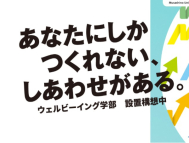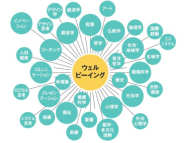JPSS, for information about studying in Japan's universities and graduate schools. > Search Japanese Universities in Tokyo. > Musashino University > Well-being
To Foreign Students Considering Studying in Musashino University. JAPAN STUDY SUPPORT is a website jointly operated by The Asian Students Cultural Association and Benesse Corporation. It provides information about studying in Japan.
The website also provides detailed information about Musashino University and its faculties of Entrepreneurship, Well-being, Global Studies, Engineering, Data Science, Literature, Economics, Business Administration, Law, and Human Sciences. Take full advantage of the site to learn everything you would like to know about Musashino University.
In addition, information for about 1,300 universities, graduate schools, two-year colleges, and vocational schools that accept foreign students is also posted.
Tokyo / Private
Opening in April 2024. The idea of "well-being”—being in a good state in all aspects such as mind, body, and society—has become increasingly important in recent years as we face a variety of problems such as environmental issues, conflicts, pandemics, poverty and inequality. The Faculty of Well-Being aims to develop human resources who can design and create well-being—happiness, fulfillment, security, welfare, health, and peace—for people and the world, through an interdisciplinary approach that incorporates the latest findings and achievements in science and technology.
■Learning from all of Planet Earth
The world is our campus. Japan is our campus. Corporations are our campuses. We will foster and produce well-being designers by integrating the experiential knowledge and creative practical skills gained from field studies in nature, the community, companies, and the w
orld outside of the Musashino Campus.
■Develop a wide range of human qualities.
After systematically learning about the "Founding Spirit" through theory and practice, students study the foundations of well-being through "Well-being Design" and "Well-being Literacy". Students will undertake hands-on learning in "Self-Understanding", "Nature and the Environment", "Community, Medicine and Welfare", "Business", and "International Understanding", as they work towards designing products and services, communities, education, and a life of well-being in "Future Design" and "Graduation Project". Students will acquire a wide range of knowledge and cultivate personal and practical skills.
■Designing and Shaping Happiness
Through a variety of studies over four years, students will comprehensively acquire the ability to "design and give shape to happiness" and creatively produce well-being for themselves, the people around them, and for the world. Specifically, students will systematically learn innovation techniques to generate innovation, and through practical learning of the social implementation of these techniques, they will proactively work to create the kind of well-being society that we want to see in the future.

The Faculty of Well-being, Department of Well-being will be established in 2024.

It is necessary to learn sociological and psychological knowledge about well-being, such as happiness, fulfilment, security, welfare, health, and peace, in addition to studying engineering and design methods for new creative designs.
In our department, we study how happiness is achieved at various levels of society, engaging in dialogue that transcends teacher/student and domestic/international boundaries to discuss the future of happiness for the world, society, individuals, and ourselves. We then encourage students to take concrete actions to realize the happiness they have found. The program takes place in a wide variety of settings, including study abroad programs at overseas universities, field studies in Japan, and collaborations with corporations. We aim to nurture and produce true "Happiness Practitioners = Well-Being Designers" by fostering and integrating the ability to learn, interact, conceive, and realize.
■Examples of future career prospects
Human resources needed to "design (create) well-being for the world, Japan (regional), and companies" in the future.
(1) Well-being Industrial Designers
Human resources who create world and industry well-being on the global stage.
(e.g.) Persons in charge of promoting well-being in educational settings and companies (manufacturers, trading companies, medical and nursing, nursing care welfare, etc.), entrepreneurs, etc.
(2) Well-being Regional Designers
Human resources who design well-being that makes the most of the characteristics of each region, and who are responsible for regional revitalization.
(e.g.) Local government civil servants aiming to create well-being communities, corporate and NPO positions, etc.
(3) Well-being Specialists
Talent who will go on to graduate school to further study the methodology of academic research on well-being and comprehensively design a world of well-being.
(e.g.) Graduate school education abroad or in Japan, employment in research institutes and think tanks, etc.
■Musashino Campus